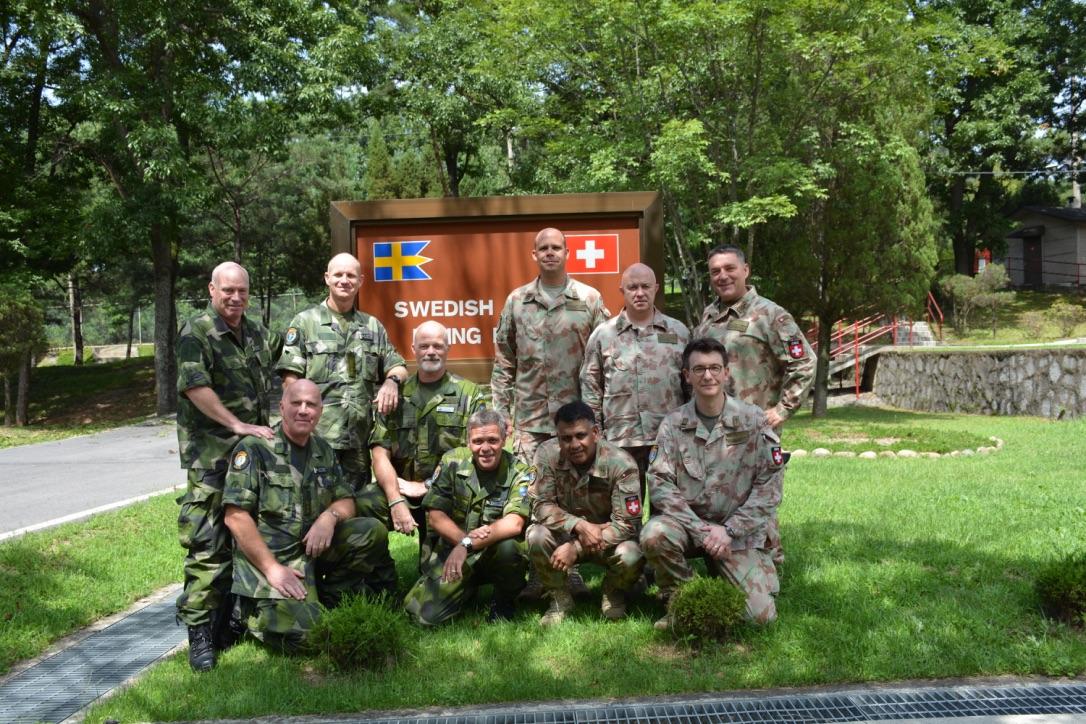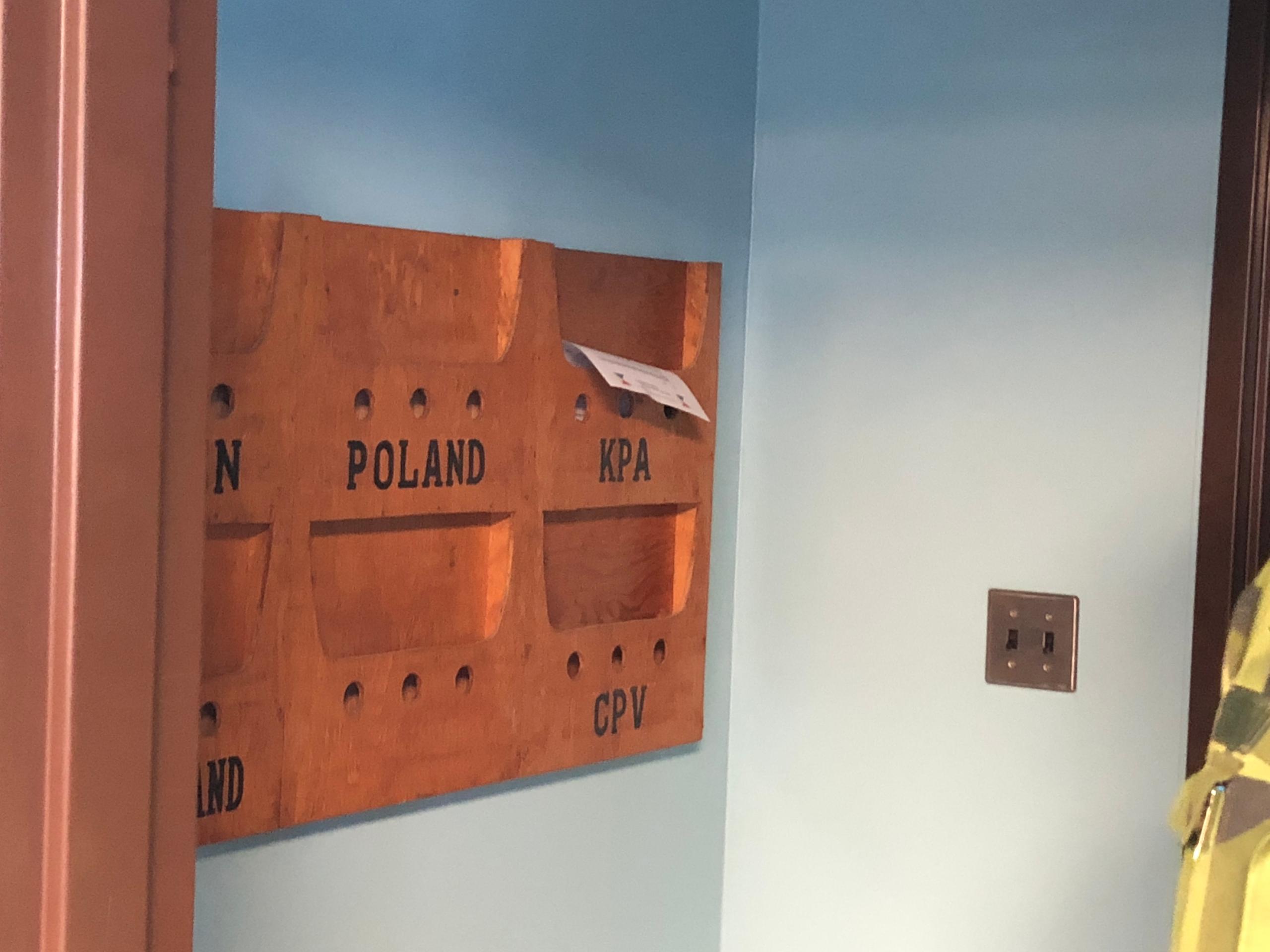
Korean peninsula’s ‘only impartial body’ watches and waits

The Swiss military contingent on the tense border between North and South Korea is keenly aware that the smallest mistake can be disastrous for humanity. Still they keep calm, a neutral force in a conflict that is far from over.
For more than six decades, Swiss soldiers have been based on the border between North Korea and South Korea, known as the Demilitarised Zone (DMZ). Despite its name, it is in fact the most militarised zone in the world. On one side are two million North Korean soldiers and 14,000 artillery guns pointed at Seoul. The other side is guarded by 600,000 South Korean soldiers.
The spark potentially leading to a Third World War could be ignited here at any time through a mistake or misunderstanding. The recent North Korean nuclear crisis has heightened the tension, especially with the knowledge that a missile would reach Seoul in 92 seconds. The professional troops’ calm demeanor belies the unspoken anxiety stretching along the 270-kilometre-long (167-mile-long) demarcation line dividing North and South.
‘Business as usual’
Several of the Swiss soldiers have been here for years as part of a unique military mission. Since 1953, a Swiss and Swedish contingent has monitored the armistice agreement that ended the war between North Korea and South Korea. The two countries are still technically at war, since there is no peace treaty.
“In spite of the heightened tension, we do not feel worried here,” says Colonel Beat Klingelfuss, 48, from Zurich. “When my mother, brother and other people from outside call, they ask how I can remain here in the middle of a war. But it is not that bad. For us, this is business as usual.”
He has been here for two years. Having been posted in in Kashmir, Afghanistan, South Lebanon and Bosnia, he has other tough assignments under his belt. But serving in the DMZ is completely different.
“The danger is not in front of your eyes in the same way. We are a very small part in a big puzzle. At the same time we are the only independent and impartial body on the Korean peninsula.”

More
A tour of the DMZ with a Swiss guard
Doing the rounds
The five Swiss soldiers and their five Swedish colleagues have a set routine. Every day they do inspections on the South Korean side, and monitor that there is no military escalation. For example, they control that no heavy weapons are being brought into the Demilitarised Zone, and that military exercises only have a defensive purpose. Sometimes they are involved in the handover of the corpses of deceased North Korean soldiers, or participate in interviews with North Korean defectors who have fled to the other side.
“We are the eyes and ears of the international community,” says Klingelfuss, pointing out that everything his team observes is reported back to the United Nations Command Military Armistice Commission (UNCMAC) run by the United States.
“In the majority of the cases all rules are followed [by both sides],” Klingelfuss says.
Daily life
On the surface, the increased military tension is barely noticeable in the DMZ. Idyllic tree groves and bird song surrounds the Swiss and Swedish base camp on a small hill, which is also home to numerous squirrels and rabbits. Each contingent has its own house including private rooms and a spacious living room with a piano.
They eat together in a common canteen, where they take turns with Swiss or Swedish cooking every other week: salmon or pea soup, raclette or dried meats. The base also has a newly renovated gym and a bunker “that we have fortunately never had to use,” says Klingelfuss.
“We are like a big family with the Swedes, we have many things in common and even celebrate Christmas together,” he says.

The colonel likens his surroundings to a nature preserve, “quiet and full of beauty” – and a stark contrast to metropolitan Seoul and its American military base where the Swiss soldiers spend four nights a week and most weekends with their families. This is the only Swiss army mission where soldiers can bring families, a fact that helps them feel “completely at home,” says Klingelfuss.
Noise wars
But it is not completely quiet in the DMZ. Gigantic loudspeakers on the North Korean side broadcast military music and propaganda about the country’s “Great Leader” Kim Il Sung all night and day. South Korea responds by blaring non-stop pop music over its own array of powerful speakers. The high-decibel clash of culture and ideology is the front line in a classic instance of psychological warfare; a noise war.
It is very strange how one can become accustomed to the sound, says one of the other Swiss soldiers, Lieutenant Colonel Yiannis Locher.
“At the beginning it was stressful but after a while you get used to it.”
The table and the door
It’s time to walk to legendary Conference Row – the place where three blue barracks connect North Korea and South Korea and where the armistice agreement was signed in 1953. The road leads over the fields via a bright blue bridge, which the Swiss and Swedish soldiers cross every day for their inspections.
Arriving at Conference Row, a North Korean soldier in a dark green uniform stands guard on the other side, watching approaching people with suspicion. A cement threshold in the middle shows the de facto border between the two countries.
A shining mahogany table sits in the center of the room inside the barracks. It is around this table that Swiss and Swedish soldiers have met every Tuesday since the Armistice. To date, there have been 3,586 meetings since 1953, every one of them with same agenda.
“Most of the time the meetings are very short “as there is not much to discuss”, says Klingelfuss.
North Korea has cut off all communications since 1995 and does not even pick up the protocols that are regularly put in a wooden letter box in the barracks. Nor do the North Koreans respond to regular phone calls from soldiers on the southern side. They call four times a day and signals are passed through – but no one picks up the phone in the North.

Then there is the famous door. A simple wooden door that leads out to North Korea on the other side. The door is always open, day and night.
Holding out hope
“Our hope is that North Korea will one day come to our meetings,” says Klingelfuss. “By being here I hope we can encourage and facilitate dialogue that could one day lead to a peace agreement.”
“The armistice agreement was only supposed to last for a few months and here we are – almost 65 years later with the same situation. It is incredible.”

In compliance with the JTI standards
More: SWI swissinfo.ch certified by the Journalism Trust Initiative

























You can find an overview of ongoing debates with our journalists here . Please join us!
If you want to start a conversation about a topic raised in this article or want to report factual errors, email us at english@swissinfo.ch.